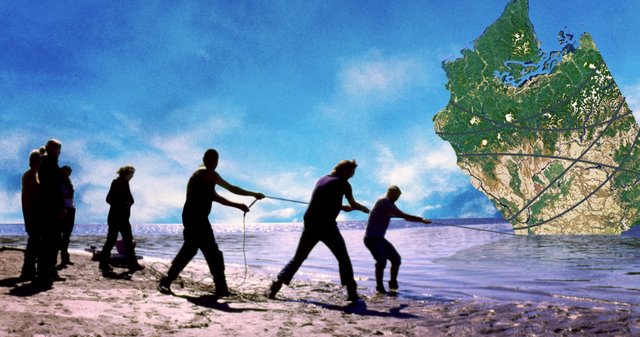Land of the Fee?
But before it could become an example for the other 49 states, the Alliance needed to make amends with a group that was key to the success of its climate proposal: the Native American tribes of Washington.
Last summer, the Alliance met with tribal leaders asking them to endorse the carbon fee. According to Fawn Sharp, president of both the Quinault and the Affiliated Tribes of Northwest Indians, the Alliance hadn’t sought meaningful feedback from indigenous communities at that time. Sharp says that’s not surprising, since tribes had not been seriously consulted in any previous carbon pricing proposals in Washington state, either.
After that meeting, Sharp and other tribal leaders announced they were considering putting their own carbon tax on the ballot in 2018. Climate change is an urgent matter for the Quinault Indian Nation, which is frantically drawing up plans to relocate from its ancestral villages because of sea-level rise.
They later scrapped their proposal after reaching an agreement with the Alliance. Six months of discussions with 29 different tribes brought forth what Matthew Randazzo, the policy consultant for the Quinault, calls “the most rigorous and extensive tribal consultation anyone I’ve been working with has ever encountered.” And as a result, I-1631 addresses myriad tribal issues, from generating aid to assist with the coastal relocation of the Quinault to mitigating the wildfire threats faced by tribes in eastern Washington.
“We said, ‘Look, for us to endorse this, tribal nations need to have a role — we need to have a voice, we need to be consulted, ” Sharp tells Grist. “And to their credit, they responded right away.”
Other groups were also wary at first. Getting approached by predominantly white environmental groups “almost felt like being tokenized,” says Edgar Franks of Community to Community, which works with immigrant farmworkers in northwest Washington. So Franks and leaders of other grassroots groups formed their own partnership, Front and Centered, to figure out how to negotiate with the traditional greens.
Last summer, Front and Centered held a series of “listening sessions” where people voiced their concerns about climate and environmental burdens. Across the state, people of color, low-income households, immigrants, and refugees took part. Franks then took the ideas he gathered from this extended community back to the Alliance.
When talking to agricultural laborers about climate legislation, Franks says, representatives from Community to Community eschewed scientific facts and figures in favor of asking about people’s perceptions of the world around them. They posed questions like: Have you noticed it’s been getting hotter? Have you been getting headaches? Do you think higher temperatures have anything to do with you getting sick?
“The science is important,” Franks explains. “But in our community, if you talk about science, it’s a way to not get invited back into the conversation.”
From an environmental standpoint, the main concern among Franks’ constituency is pesticide exposure, which many farmworkers say causes headaches. Although I-1631 doesn’t address pesticides, it’s safe to say that climate change is making their lives more difficult. After all, they toil long hours to meet harvest quotas and don’t get breaks or days off when ambient conditions become dangerous — like when temperatures soar over 100 degrees Fahrenheit or when wildfire smoke hangs heavy in the air.
Another concern is that higher fuel prices could hurt the agriculture industry. Thus, the carbon fee is designed to exempt diesel fuel used solely for agricultural purposes, like transporting produce from a farm.
It also exempts some industries, like aluminum. These so-called “energy-intensive, trade-exposed” industries have prices for their commodities set by international markets. Some worry that if they’re charged extra to operate in Washington, they could pick up shop and pollute elsewhere.
Schaefer from Front and Centered says she hopes Washington can work with these industries to bring down emissions while also keeping them in the state. “We want to hold large corporate polluters responsible for the mess they’re creating,” she says. “But we don’t want to make people poor or have workers lose their jobs in the process.”
As a result, the Protect Washington Act includes a provision to set aside a minimum of $50 million a year to help protect workers “who are affected by the transition away from fossil fuels to a clean energy economy.” That money would go toward protecting incomes and benefit plans for everyone from farm workers to refinery workers, as well as supporting job retraining.
These accommodations for labor, Franks says, are a big reason why he thinks farmworkers are supporting the initiative. That along with the feeling that their concerns were heard for once.
“It’s not just a policy for us,” Franks says. “It’s personal.”
Posted from my blog with SteemPress : https://selfscroll.com/land-of-the-fee/
